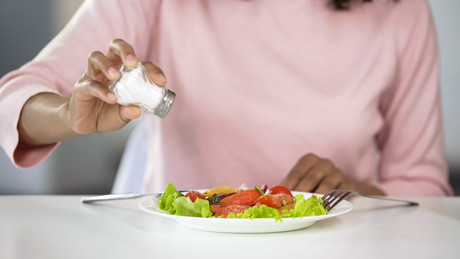It's ok to enjoy salt with your meal

If you enjoy salt with your meal, relax. New research has found that unless you’re consuming more than 5 grams a day — or 2.5 teaspoons of salt — you have nothing to worry about.
Fewer than 5% of individuals in developed countries exceed that level, and even for these individuals there is good news: any health risk of sodium intake is virtually eliminated if people improve their diet quality by adding fruits, vegetables, dairy foods, potatoes and other potassium-rich foods.
The research is by scientists of the Population Health Research Institute (PHRI) of McMaster University and Hamilton Health Sciences, along with their research colleagues from 21 countries.
The study, published in The Lancet, followed 94,000 people, aged 35 to 70, for an average of eight years in communities from 18 countries around the world and found there is an associated risk of cardiovascular disease and strokes only where average intake is greater than five grams of sodium a day.
China is the only country in their study where 80% of communities have a sodium intake of more than 5 grams a day. In the other countries, the majority of the communities had an average sodium consumption of 3 to 5 grams a day (equivalent to 1.5 to 2.5 teaspoons of salt).
“The World Health Organization recommends consumption of less than 2 grams of sodium — that’s one teaspoon of salt — a day as a preventative measure against cardiovascular disease, but there is little evidence in terms of improved health outcomes that individuals ever achieve at such a low level,” said Andrew Mente, first author of the study and a PHRI researcher.
He added that the American Heart Association recommends even less — 1.5 grams of sodium a day for individuals at risk of heart disease.
“Only in the communities with the most sodium intake — those over 5 grams a day of sodium — which is mainly in China, did we find a direct link between sodium intake and major cardiovascular events like heart attack and stroke.
“In communities that consumed less than 5 grams of sodium a day, the opposite was the case. Sodium consumption was inversely associated with myocardial infarction or heart attacks and total mortality, and no increase in stroke.”
Mente added: “We found all major cardiovascular problems, including death, decreased in communities and countries where there is an increased consumption of potassium which is found in foods such as fruits, vegetables, dairy foods, potatoes and nuts and beans.”
Most previous studies relating sodium intake to heart disease and stroke were based on individual-level information, said Martin O’Donnell, co-author of the report, a PHRI researcher and an Associate Clinical Professor of Medicine at McMaster.
“Public health strategies should be based on best evidence. Our findings demonstrate that community-level interventions to reduce sodium intake should target communities with high sodium consumption, and should be embedded within approaches to improve overall dietary quality.
“There is no convincing evidence that people with moderate or average sodium intake need to reduce their sodium intake for prevention of heart disease and stroke,” said O’Donnell.
2026 HESTA Excellence Awards — nominations open
Nominations have opened for the 2026 HESTA Excellence Awards, which encompass the aged care,...
Hospital fined $230K after aged care chair detachment
A hospital has been fined $230,000 over an incident involving a 93-year-old aged care resident...
Alliance to lay foundations for national creative health infrastructure
Creative Health Alliance Australia launched this month, in order to lay the foundations for...


![[New Zealand] Transform from Security Awareness to a Security Culture: A Vital Shift for SMB Healthcare — Webinar](https://d1v1e13ebw3o15.cloudfront.net/data/89856/wfmedia_thumb/..jpg)
![[Australia] Transform from Security Awareness to a Security Culture: A Vital Shift for SMB Healthcare — Webinar](https://d1v1e13ebw3o15.cloudfront.net/data/89855/wfmedia_thumb/..jpg)




